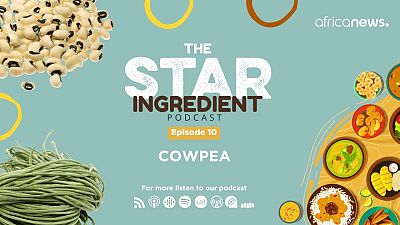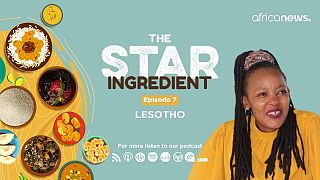af_the-star-ingredient
Niébé is an essential ingredient in Senegalese street food. Branded as ‘food for the poor’ by the colonists, the cowpea has long been neglected by African countries. But chef Fati Niang is determined to give niébé a comeback as a popular legume used to flavor fancy finger food recipes like accras.
Niébé, also known as black eyed pea or cowpea, is a crop native to West Africa. Characterized by its resistance to drought, resilience to the effects of climate change and remarkable nutritional value, niébé is a pillar of the Senegalese gastronomic tradition. However, this crop has long been cast aside by African countries, dating back to the colonial era when it was dismissively referred to as ‘food for the poor’ by European colonialists.
For this episode of The Star Ingredient, we went back to Senegal to learn more about niébé. Here we met Fati Niang, a chef and entrepreneur that guided us through the busy stands of Castor Market, in Dakar.
We experienced the great tradition surrounding Senegalese street food, tasted the delicious accras of niébé and learned about Black Spoon, Niang’s project which aims to make a kind of elevated street food.
Street food, an essential player in Senegalese gastronomy
Street food plays a key role in the Senegalese culture. According to data from the Senegalese Ministry of Economics and Finance shared with the newspaper El País, more than 40% of Senegalese family outgoings are spent on food and more than 95% of this money goes on informal eating.
“Now it has become more structured. You find people who are hiring, people who are launching their own businesses. I think it's also a way of combating unemployment”, explains Abdou Ka, a food anthropologist at Ziguinchor University, in Senegal. And, when it comes to street food, it is female employment in particular that gets a boost. As the Food Agricultural Organization underlined, more than 50% of the Senegalese street market jobs are held by women. Yet in these businesses, there is one thing missing: native Senegalese ingredients like niébé.
“Before colonisation, we had traditional cereals and pulses, which people grew as part of their daily diet. But because of colonisation, we began to undervalue certain foods that we eat regularly, and we called them lowly food crops”, explains Abdou Ka.
Relegated to rural areas because of its resistance to arid lands and its versatile nature, niébé has struggled to reach populations in urban centres, where imported products like cereals and peanuts dominate.
Today, it is still complicated to find niébé on the streets, but Niang is determined to bring about a revival of this neglected culture.
Fati Niang, Black Spoon and the mission to revive indigenous crops
Raised in Creil, an hour from Paris, Fati Niang’s heart is divided between two countries. On the one hand, there’s France, where she grew up and began her career in business. On the other, Senegal, where she spent her holidays as a child, enjoying the rich and spicy street food offerings with her family and friends.
Fati Ning learned to cook when she was a teenager, following her family’s passion for gastronomy. Yet, both in Senegal and France, she struggled to find her favorite flavours. “ I noticed that when I came on holiday here with family friends, when we wanted to eat a thieboudienne (our national dish) outside, it was a bit difficult to find”, Niang told our reporter.
As she described, traditional specialities like the thieboudienne - made from fish, rice and vegetables seasoned with a succulent blend of West African spices - are the domain of street sellers and more difficult to find than burgers, pizzas and sushi.
Tired of struggling to enjoy traditional African flavours in France and Senegal, in 2013 Niang launched Black Spoon, her first upscale food truck serving Senegalese dishes in Paris.
”I set myself the task of creating a modern African concept, introducing people to African dishes and ingredients, but in a fresh, innovative way that would be accessible to everyone”, explains Fati Niang.
Perfect for professional events and festivals, the fancy food track soon yielded significant results. After one year, Black Spoon doubled its turnover and in 2014 Niang won the prize for best African entrepreneur in France.
In 2017, inspired by her dual identity, Niang took her business to Senegal. Here, she offered her food in new set-ups to reach as many people as possible. After the pandemic, Black Spoon entered into a partnership with the French multinational energy company, Total Energies, and opened a tiny restaurant in a petrol station on the motorway next to Dakar. “They offer French food, and the population is 95% to 98% Senegalese. They were missing something. It was the African culture. So they decided to Africanise the gas stations a little”, she explained to our reporter.
And Black Spoon, with its recipes made from indigenous crops like cowpea, can clearly offer this African touch.
Accras of niébé - the recipe that will save your picnic!
Using the Star Ingredient of this episode, the versatile niébé, Fati Niang decided to cook accras of niébé, an ubiquitous recipe of her fast food business, Black Spoon. Vegan and gluten-free nuggets that can save your excursions and picnics.
Ingredients
cowpea
water
chili
garlic
pepper
Preparation
Cowpeas need to be soaked for 8-12 hours (like chickpeas) before cooking
Grind them and crush them in a pestle and mortar.
Or
Dry the cowpeas
Mix them in a food processor
Shape the mixture into accras, similar to small nuggets
Put some oil in a saucepan and fry your accras in the pan
And then enjoy!!
If you’re hungry for more recipes and stories about indigenous African ingredients, listen to the first 9 episodes of our series.
The podcast The Star Ingredient was funded by the European Journalism Centre, through the Solutions Journalism Accelerator. This fund is supported by the Bill & Melinda Gates Foundation.


















02:40
Climate-smart seeds cultivate hope for Kenya's agricultural future
01:20
U.S. secretary of state Antony Blinken emphasizes global food security commitment at Davos
01:57
Nigeria: Rice prices skyrocket as local production declines
Go to video
Podcast| Are edible insects the food of the future?
11:00
Building Africa's largest audio library [Inspire Africa]
01:12
FAO report assesses impact of disasters on agriculture and food security